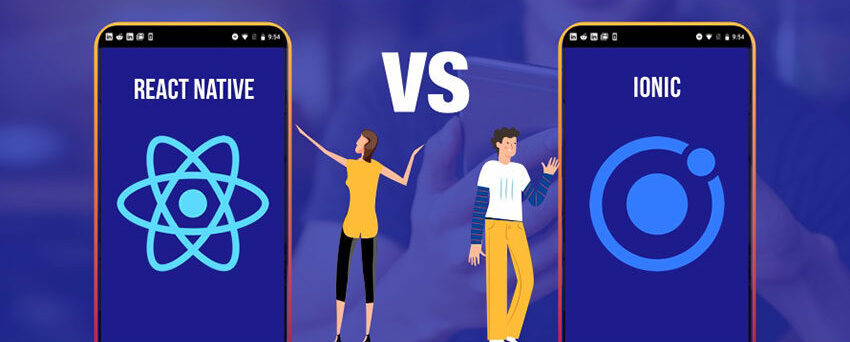React Native vs. Ionic: Which Is the Best Cross-Platform Framework?
In the rapidly evolving landscape of mobile app development, cross-platform frameworks have gained significant popularity. Two of the most prominent contenders in this domain are React Native and Ionic. Both frameworks offer developers the ability to build mobile apps that can run seamlessly on multiple platforms. However, when it comes to choosing the right framework, developers need to consider various factors such as performance, development experience, community support, and more. In this article, we will compare React Native and Ionic, examining their strengths and weaknesses to determine which is the best cross-platform framework for your project.
React Native: Harnessing the Power of JavaScript and Native Performance
React Native, developed by Facebook, has emerged as a robust and widely adopted cross-platform framework. Leveraging the power of JavaScript, React Native enables developers to build native-like mobile applications for both iOS and Android platforms. By employing a single codebase, React Native allows developers to write once and deploy across multiple platforms, thus saving time and effort.
One of the significant advantages of React Native is its performance. By utilizing native components, React Native achieves near-native performance, providing a smooth and responsive user experience. The framework allows for direct access to native APIs, enabling developers to tap into the full potential of the underlying platform.
Another key strength of React Native is its thriving community and vast ecosystem. This framework boasts an extensive collection of pre-built components and third-party libraries, allowing developers to expedite the development process and enhance app functionality. Moreover, the vast community support ensures quick issue resolution and a continuous flow of updates and improvements.
Ionic: Simplicity and Wide Compatibility
Ionic, an open-source framework built on top of AngularJS, has gained traction for its simplicity and ease of use. With Ionic, developers can create cross-platform applications using web technologies such as HTML, CSS, and JavaScript. It offers a wide range of UI components, themes, and plugins, enabling developers to build visually appealing and feature-rich applications.
One of the notable advantages of Ionic is its compatibility with various platforms, including iOS, Android, and even progressive web applications (PWAs). This versatility allows developers to target a broader audience and deploy apps across multiple channels with minimal effort. Furthermore, Ionic integrates smoothly with Cordova and Capacitor, empowering developers to access native device features through a unified interface.
While Ionic offers excellent compatibility and a user-friendly development experience, its performance may not match that of React Native. Since Ionic relies on WebView, it often lacks the native-like performance and responsiveness achieved by React Native. However, for less demanding applications or prototypes, Ionic can provide a cost-effective and efficient solution.
React Native vs. Ionic: Key Considerations
Performance:
React Native excels in terms of performance, providing near-native app experience due to direct access to native APIs. On the other hand, Ionic, while offering broad compatibility, may fall short in achieving the same level of performance.
Development Experience:
React Native, with its JavaScript background and well-documented ecosystem, offers a smoother development experience. Ionic, built on web technologies, may be more familiar to web developers, but React Native provides a more native development environment.
Community and Ecosystem:
Both React Native and Ionic have active communities, but React Native’s community is larger and more mature. React Native benefits from a vast array of third-party libraries and components, contributing to rapid development.
Native Access:
React Native offers direct access to native APIs, enabling developers to implement platform-specific features more seamlessly. Ionic relies on plugins and wrappers, which might introduce limitations and additional complexity.
Learning Curve:
React Native may have a steeper learning curve, especially for developers who are new to JavaScript and React. Ionic, with its web development background, may have a more accessible learning curve, particularly for developers familiar with web technologies like HTML, CSS, and JavaScript.
Tooling and IDE Support:
Both React Native and Ionic have robust tooling and IDE support. React Native integrates well with popular development tools like Visual Studio Code and offers a rich set of debugging and testing tools. Ionic, being built on top of AngularJS, benefits from the extensive tooling and ecosystem of Angular, making it a solid choice for developers already using Angular in their projects.
Conclusion:
Choosing the best cross-platform framework between React Native and Ionic depends on various factors and project requirements. React Native excels in performance and native-like experience, making it suitable for complex and performance-critical applications. It benefits from a mature ecosystem and extensive community support, providing a robust development experience.
Ionic, on the other hand, offers simplicity, wide compatibility, and a familiar web development approach. It is a suitable choice for less demanding applications, prototypes, or when web developers want to leverage their existing skills. Ionic’s compatibility with multiple platforms, including PWAs, can be advantageous for reaching a broader audience.
Ultimately, the decision between React Native and Ionic should consider factors such as performance needs, development experience, community support, and project requirements. Evaluating these aspects will help determine which framework aligns best with your development goals and enables you to build high-quality cross-platform applications.
In addition, If you are looking to create native apps, java developers for hire can be a great choice. Java is a widely-used programming language known for its robustness, flexibility, and platform independence. With Java, developers can build high-performance, scalable, and secure applications that can run seamlessly on various operating systems and devices.


















